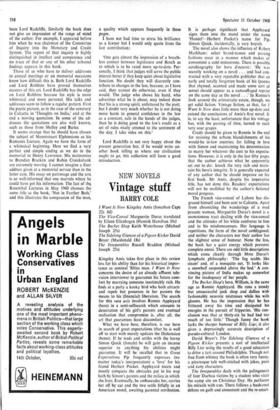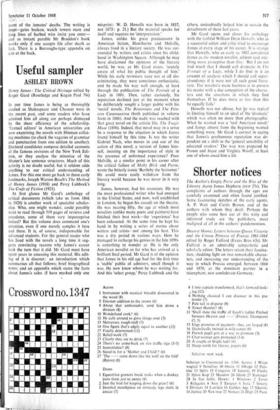NEW NOVELS
Vintage stuff
BARRY COLE
The Vice-Consul Marguerite Duras translated by Eileen Ellenbogen (Hamish Hamilton 30s) The Bucket Shop Keith Waterhouse (Michael Joseph 25s) The Sidelong Glances of a Pigeon Kicker David Boyer (Macdonald 18s) The Inseparables Russell Braddon (Michael Joseph 25s) Kingsley Amis takes first place in this review less for his ability than for his historical impor- tance as seminal 'fifties man. I Want It Now concerns the desire of an already affluent tele- vision interviewer to guarantee his future com- fort by marrying someone inestimably rich. He finds at a party a kooky bird who both attracts and repels but possesses in her parents the means to his (financial) liberation. The search for this rara avis involves Ronnie Appleyard (hero) in a semi-selfsearch which amounts to desecration of his girl's parents and eventual realisation that compromise is, after all, the art that guarantees least discomfort.
What we have here, therefore, is our hero in search of great expectations (that he is well off to start with merely updates the Dickensian theme). If he weds and settles with the horny Simon Quick (female) he will gain an income superior to anything his abilities might guarantee. It will be recalled that in Great Expectations Pip frequently expresses (no matter today's interpretation) a 'love' for his friend Herbert Pocket. Appleyard meets and mostly conquers the obstacles put in his way both by Simon's parents and the milieu in which she lives. Eventually, he ambuscades her, carries her off by car and the two settle fitfully in an American motel, awaiting parental retribution. It is perhaps significant that Apple yard signs them into the motel under the name 'Handel'—Herbert Pocket's name foil Pip. Simon Quick, incidentally, is very boyish.
The novel also shows the influence of Robert Markham: select brand-names and passing
fashions recur in a manner which makes of
consommé a cold minestrone. There is possible autobiography for hors d'oeuvre: 'He was secretly working on a novel . . . and had con- tracted with a very reputable publisher that an early and totally forgotten book of his (poems that rhymed, scanned and made some sort of sense) should appear as a camouflaged reprint on the same day as the novel . . In Ronnie's look around the aristocratic estate, though, we
get solid fiction. Vintage fiction, at that, for 1 Want It Now does little more than up-date and
extend the conclusions of Amis's first novel. It is, to say the least, unfortunate that his vintage has, with the passing of time, turned to such very sour grapes.
Credit should be given to Ronnie in the end for resisting the urbane, blandishments of his would-be in-law enemies; for falling in love with Simon and maintaining his determination to marry her whatever the cost to his expecta- tions. However, it is only in the last fifty pages that the author achieves what he apparently set out to do : knock the very rich and main- tain his hero's integrity. It is generally expected of any author that he should improve on his first book. Mr Amis, despite his imperative title, has not done this. Readers' expectations will not be mollified by the author's fictional moral progress.
The French vice-consul of Lahore has dis- graced himself and been sent to Calcutta. Apart from chronicling the wanderings of a mad peasant woman, Marguerite Duras's novel is a monotonous tract dealing with the vice-consul and the attitudes of his white confreres to him and to his misdemeanours. Her language is repetitious, the form of the novel amblygonal, and neither the characters nor their author has the slightest sense of humour. None the less, the book has a quiet energy which prevents complete ennui. There are odd little descriptions which come cleanly through Mme Duras's lymphatic philosophy : 'The fog scalds like steam' and, of a mosquito net, 'It looks like
a snowball suspended above the bed.' A con- vincing picture of India makes up somewhat for the inadequacy of her people.
The Bucket Shop's hero, William, is the same age as Ronnie Appleyard. He runs a trendy
but unsuccessful junk shop and dailies with fashionably neurotic mistresses while his wife glooms. He has the impression that he has frittered away his time and dissipated his energies in the pursuit of fripperies. 'His con- clusion was that at thirty-six he had had too
much of too little.' Though funny the book lacks the sharper humour of Billy Liar; it also gives a depressingly accurate description of pseudo-cultural London..
David Boyer's The Sidelong Glances of a Pigeon Kicker presents a sort of intellectual Billy Liar using the results of a good education to drive a taxi around Philadelphia. Though not free from whimsy the book is often very funny, a picaresque tale well-stitched with jokes, puns and zany characters.
The Inseparables deals with the palingenesis of four Dachau victims by a student who visits the camp site on Christmas Day. He performs his miiacle with LSD. There follows a bush-root debate on guilt and atonement and the re-enact- ment of the inmates' deaths. The writing is inept—gates beckon, watch towers stare and long lines of barbed wire insist you enter— and as instant parable Mr Braddon's book works only if one accepts life after death as fact. There is a Burroughs-type appendix on Lso at the back.







































 Previous page
Previous page